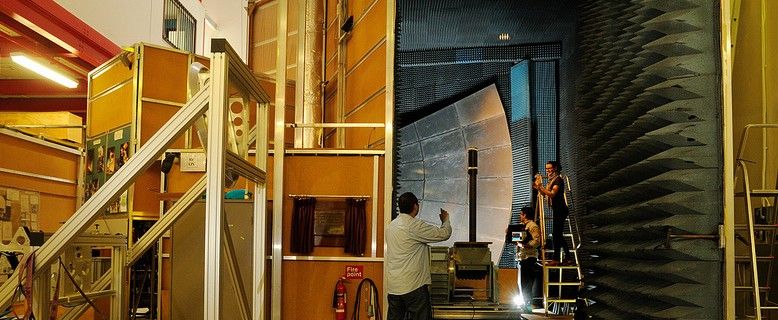Millimetre-wave CATR
The Millimetre-wave CATR is a unique offset tri-reflector Cassegrain-Gregorian system design to work up to mm-wavelength bands.

The Antenna Research Group at Queen Mary University of London has a long-standing record on antenna design and related electromagnetic research. The fundamental philosophy behind the group’s research has always been driven by highly reliable electromagnetic modelling corroborated by high quality experimental verification. In its >50-year history, the group has built an extensive antenna test range and electromagnetic characterisation facility, which now covers the whole RF to THz frequency bands, from 400 MHz to 500 GHz. In addition to this, time domain spectrometry at THz frequencies, between 0.1 to 3 THz, is also available.
Supported by three full-time professional staff, the facility is arguably one of the most comprehensive among European universities and it includes:
The Millimetre-wave CATR is a unique offset tri-reflector Cassegrain-Gregorian system design to work up to mm-wavelength bands.
Opened in 1995, this 9 metre long with 3m by 3m cross-section microwave and millimetre wave anechoic chamber is used for the measurement of radiation characteristics of feeds and millimetre wave antennas up to 500 GHz.
The NSI Planar near-field to far-field antenna measurement scanner is an ideal system for measuring medium and high gain antennas (>15 dBi) with small apertures.
The THz TDS system is based on a NPL design that has been adapted to accommodate fluid and gaseous based systems for study by either reflection or transmission configurations
The Body-Centric Wireless Sensor Lab is a new joint research facility with the Department’s Networks Research Group.
Currently, the AML is equipped with state-of-the-art Vector Network Analysers showing unprecedented low levels of background noise.
The MPS150 is easy to use, yet highly-precise manual probe system for wafers and substrates up to 150 mm.
The facilities are currently being used for development of photo-activated semi-conducting polymers for non-mechanically controlled RF phase-shifters.
NSI-MI Spherical Near-field/Far-field Measurement System. The phi over theta scanner from NSI-MI Series 700S-60 has the capability of a full spherical, phi/theta-360 deg, rotation with a step resolution of 0.01 degrees in both phi and theta rotations.
The Microwave CATR reflector is a parabolic single offset antenna of 6 m tall and 3 m wide constructed from 18 high precision surface panels.
The Modular Quasi-Optical Test Bench is a flexible test system, which can be easily reconfigured enabling multiple circuit setups.
The mm-wave chamber houses a Spherical Near-field/ Far-field mm-wave Measurement System that represents an excellent solution for measuring stationary mm-wave on-chip antennas and applications from 26 GHz up to 500 GHz.
The Mobile Antenna EMC Screened Anechoic Chamber 6x5x3 m can operate from 700 MHz to 10 GHz, with an Anritsu MS46322A Vector Network Analyzer (0.001–20 GHz, 100 dB dynamic range) for beam pattern measurements and antenna return loss measurements.
Additive manufacturing (AM) represents a set of processes that enable layer by layer fabrication of complex 3D structures using a wide range of materials.
The Antenna Measurement Laboratory is located in the Engineering Building on the Mile End campus in London. The laboratory can be easily reached by using the London Underground system (Central line – Mile End station, Hammersmith & City Line and District Line – Stepney Green station).
A map of the Campus and travel information can be found on the main college website.
For enquires about hire and use of the antenna laboratory facility, please contact:
Dr. Max Munoz
Antenna Research Laboratory Manager
School of Electronic Engineering and Computer Science
Queen Mary University of London
Mile End Road
London, E1 4NS, UK
Email: m.o.munoztorrico@qmul.ac.uk
Tel: +44 (0)20 7882 5521 or +44 (0)20 7882 7146
Fax: +44 (0)20 7882 7997